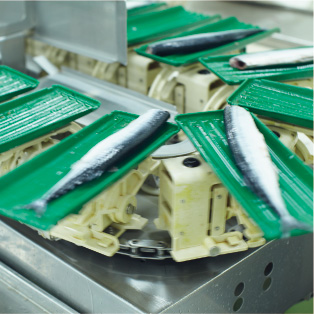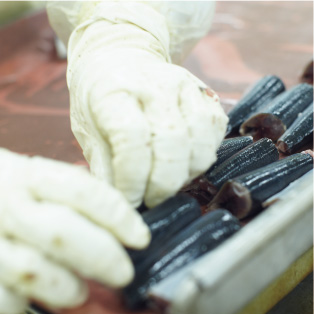
Yayoi Sunfoods
Co.,Ltd.
988-0103 168-1 Akaiwanko, Kesennuma-City, Miyagi
President and CEO: Makoto Mizoguchi
Manager of Kesennuma Matsukawa Factory: Mizuki Onodera
TEL:+81-(0)226-22-6363
FAX:+81-(0)226-23-8256
HP :http://www.yayoi-sanfoods.co.jp
Loved and trusted over many years,
Yayoi Sunfoods’ prepared frozen food items have been eaten at meals at home and school lunches
Yayoi Sunfoods is a pioneer of the processed frozen food industry that produces in bulk for businesses such as school lunches. They produce mackerel simmered in miso and other items that are a favorite lunch menu item at schools nationwide.
Taste and materials
Here in Kesennuma, the company continues to produce processed foods that have been loved for many years.
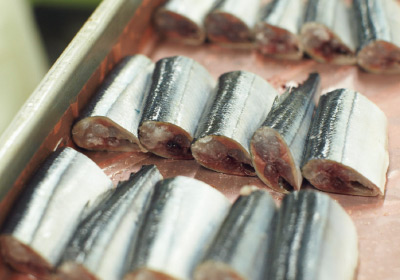
Equipment
At present, although the company’s production system is not up to its usual production level, they are making every effort to restore the factory to its state before the 2011 tsunami.
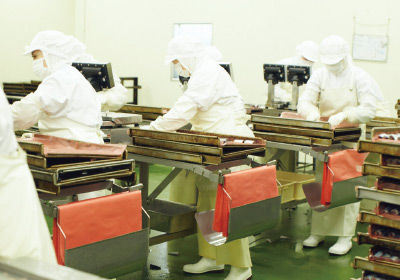
Craftsmanship
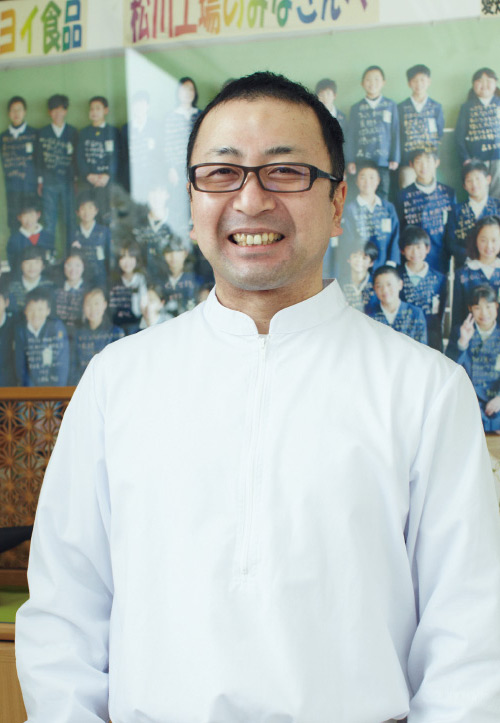
To engrave this deliciousness in the hearts of children.
Yayoi San Foods Co., Ltd. Production Headquarters, Kesennuma Matsukawa Factory Manager (also General Affairs Section Manager) – Mizuki Onodera
The revival of that taste awaited by children.
It feels somehow nostalgic. The moment I took a bite, I felt that way. The beloved taste that I’ve been accustomed to since childhood…
And there’s a reason for that. For over 30 years, it has been cherished as a staple in school lunches nationwide – “Saba no Misoni” by Yayoi San Foods Co., Ltd. It’s a taste that has nurtured two generations: today’s elementary school students and their parents.
Upon visiting the headquarters, I was escorted to the second floor by Mizuki Onodera, who serves as both the Production Manager at the Yayoi San Foods’ Matsukawa Factory in Kesennuma and the General Affairs Manager.
As I reached the landing, about to proceed to the office, my feet instinctively stopped. What caught my eye were the collective photographs and messages from elementary school students across the country adorning the walls. Among the expressions of gratitude for the deliciousness and well-wishes for graduation, there were also encouraging messages and group photos from a school in Aichi Prefecture sent after the disaster. “During the disaster, we received many words of encouragement and condolences from children all over the country,” Mr. Onodera explained. “Although the factory was affected by the disaster, we were determined to respond to those voices…” he continued, describing how they managed to secure a small production line in their current location and revive the long-awaited “Saba no Misoni.”
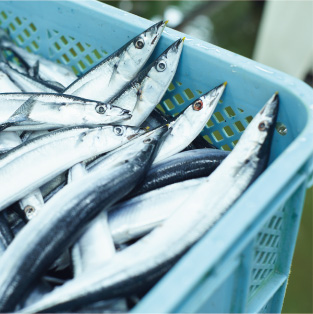

I learned both hardship and joy during my solo assignment to Kyushu.
Onodera was born and raised in Kesennuma. During high school, he was a member of the cycling club and excelled in road racing, achieving third place in the prefectural tournament and participating in the national tournament as part of the Tohoku team. Although he transitioned from bicycles to motorcycles, he still loves two-wheeled vehicles and enjoys outdoor activities, often riding to feel the wind.
While Onodera had been devoted to life in Kesennuma, in 2010, he was assigned to the Kyushu factory in Omuta City, Fukuoka Prefecture, leaving his family behind for a solo assignment.
He recalls experiencing a series of “culture shocks” in a positive sense. First and foremost was the language barrier. “It was tough until I could understand the unique intonation of the region,” he laughs. He was also surprised by differences in lifestyle, culture, and the types of fish commonly consumed in the region.
Since Onodera’s arrival, the company has taken the lead in holding an annual “Sanma Festival” in Omuta City. They deliver 3000 fresh Pacific saury from Kesennuma to treat the locals. “It’s a fulfilling job to interact with many people in various ways, not just through school meals, and to see them happy,” says Onodera, his smile sincere and heartfelt.
With the strong spirit of the people of Tohoku, We must do our best, right?
The painful news of the earthquake was heard in Kyushu. I was very worried about Kesennuma, but when the factory was damaged, we welcomed many employees to the Kyushu factory and worked together. Even after the earthquake, I didn’t change my address to Kesennuma and continued to pay taxes to support the reconstruction efforts in the local area.
During my assignment in Kyushu, I noticed something. It was the difference between Kyushu men and Tohoku men. Before I went there, the general perception was that “Kyushu men are hot-tempered,” but when I actually went there, I thought, “No, that’s more like Tohoku men.” Not in terms of being rough, but in terms of the intensity of the feelings they hold inside. Surely, Tohoku people are stronger. After experiencing that earthquake and now navigating the path to recovery, I once again realized this. Perhaps it’s a mantra for myself and my fellow colleagues who are working hard to overcome the disaster.
“When I think I have to do my best, it’s now,” says Onodera. “I’m sure I’ll answer like this every day until the factory is revived.” We’re cheering for you, along with children across the country.
